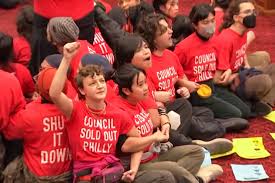PHILADELPHIA — City Council has approved a $1.3 billion plan to bring a brand new arena for the Philadelphia Sixers to the Market East community in Center City, clearing the way for the project’s future.
During its scheduled meeting on Thursday, Dec. 19, City Council voted in favor of the legislative package, with a majority of members supporting the plan. This approval followed months of negotiations with developers, community meetings across the city, and protests from both sides of the debate. The plan is expected to have a transformative effect on the area.
A raucous start
At the start of Thursday’s hearing, a group of individuals opposing the arena plan protested by standing arm-in-arm, chanting, and blowing whistles on the floor of City Council’s chambers in City Hall.
The protestors, wearing shirts that read “City Council sold out Philly” and “shut it down,” sat in a group as the meeting, scheduled to begin at 10 a.m., got underway.
Around 10:15 a.m., law enforcement officials escorted several protestors out of the room.
By 10:25 a.m., law enforcement had removed the protestors from the floor of the chambers, but the crowd in the room continued to chant.
As City Council President Kenyatta Johnson tried to begin the meeting, chants of “shame” echoed throughout the chambers.
The meeting finally came to order around 10:35 a.m., though some commotion persisted.
In his opening remarks, Johnson addressed the crowd, urging attendees to respect the process. He reminded them that council had held eight hearings solely dedicated to the arena plan.
“All we are asking is just respect our process and let us continue our business,” Johnson said at the start of the meeting.
Public comment, which included an “extremely long list” of speakers according to Johnson, began with input from both sides of the issue.
Several individuals spoke in favor of the arena, highlighting its potential economic impact and the jobs it could bring to the city.
“We want to make sure that this arena is built,” said Daisy Cruz of the service workers union 32BJ SEIU. “Thank you for the opportunity. Thank you for building the arena.”
Paul Brown, a school psychologist from the city’s Roxborough community, argued that council should have pushed for more funding for the school district in the agreement with arena developers.
“You are in a prime opportunity right now to demand something better, that doesn’t displace people, that doesn’t harm people, but you just want to rush through a deal that gives them less,” he said.
How did the voting go?
Each of the 11 pieces of legislation required its own vote.
The majority of these bills passed with a 12-5 vote.
The councilmembers who opposed nearly every bill in the package were Jamie Gauthier (D-3rd dist.), Rue Landau (D-At-Large), Jeffery Young (D-5th dist.), Kendra Brooks (Working Families Party, At-Large), and Nicolas V. O’Rourke (Working Families Party, At-Large).
However, a few bills received support from more council members.
For example, a bill creating an overlay for the Chinatown neighborhood passed with a 14-3 vote.
Other bills passed unanimously.
What’s next?
The proposal would bring an arena to the intersection of Market and Filbert streets at 10th and 11th streets.
Before the day’s vote, City Councilmember Mark Squilla (D-1st dist.) said that even after the vote, City Council would continue meeting with stakeholders and community members to ensure neighbors remain involved in the development process.
“This is not the end of the process,” Squilla said.
City Council has held meetings since September focused solely on the arena plan, and some issues have arisen.
The biggest issue may be the amount of money the developers plan to include in the Community Benefits Agreement (CBA) with the neighborhoods closest to the project site.
Initially, developers proposed $50 million for the agreement, but some suggested doubling that amount.
In fact, some members of groups opposing the development had pushed to increase the figure to $300 million.
However, in legislation presented to City Council for its first reading last week, the proposal was amended to request $60 million for the CBA.
Amendments outlining how this $60 million could be used in the community indicate that $33 million would go toward initiatives in and around the city’s Chinatown neighborhood—such as developing a master plan for the area and providing $2 million in grants for small businesses.
The remaining $27 million would fund other citywide initiatives, including $7 million for extended day/extended year schooling and $3 million for public transit at the arena.
With City Council’s support on Thursday, construction is expected to begin in 2028.
Developers aim to open the arena in 2031.

